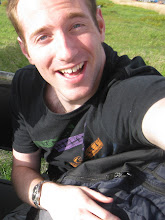The concept of hitchhiking is pretty simple. Enter a car at point A, exit at point B, mission accomplished. I hope you’re shaking your head though, because by now you know that in Japan there’s always more to the story. The Japanese have a way of pulling you into their world.
An old crab fisherman helped me find a campsite near the town of Rausu.
“This town is special,” he told me. “It’s the best place in Japan.”
He looked wise. I believed him. I mentioned that the town’s name is pronounced similarly to the wingless human disease agent, "louse.” He quite enjoyed the comparison.
I pitched my tent and called Yoshida-san, who I’d met at the hockey party the night before. He came unexpectedly to the campsite with a home-cooked meal for me - fresh fish, of course.
He took me for a scenic drive along the Shiretoko Peninsula with his very curious 5 year old son, who was fascinated by the deer grazing beside the road.
“Why are there deer here? What do they eat? How many deer are there? Do they have names? How old are they?”
Dad patiently answered each of his son’s questions. I admired that. Sometimes I see parents thoughtlessly dismissing their kids’ endless requests for answers and explanations, and though I’m not a parent, I can’t imagine not indulging the curiosity of an inquisitive little tyke.
Next, Yoshida-san took me to meet a friend of his, Arakawa-san, a burly vice-principal and former judo champion. I don’t imagine he has a lot of problems with discipline at the junior high school where he works.
Over dinner, he asked for my help teaching English to his class of 11-13 year olds the following morning. Two classrooms in two days? Is this a sign? Should I be teaching instead of traveling?
Maybe so, but our next stop was a unique hot spring outside of town. It was unlike any hot spring I’d been to and I’ll certainly never forget it. It was one of my favourite experiences in Japan.
The infamous Bear’s Hot Spring lies deep in the forest. It is entirely outdoors and entirely free, meaning there are no staff, no showers, no coin-lockers, and no ticket-vending machines to remind you of civilization. It’s just you, steaming hot water, and mother nature.
I followed the two men through the darkness across an old, rickety bridge, down a winding dirt path through the trees. It’s a monthly pilgrimage for the men, who seek tranquility, catharsis, and probably a little time away from their wives.
The air was crisp, the moon was full, and a nearby river flowed to nature’s rhythm, calming the mind and soothing the senses. Steam, illuminated by starlight, rose from the water’s surface and disappeared upward among the trees.
I got in slowly, adjusting to the hot water. No one spoke; we just closed our eyes and relaxed. I breathed the warm steam into my lungs and felt my heartbeat slowing to a measured, rhythmic pulse. Time passed, unnoticed and unmissed.
The Bear’s Hot Spring is thought by many to have a spiritual quality.
Colour me a believer.




























